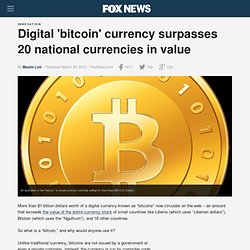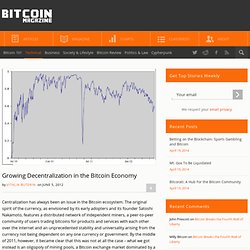

EconoWorld. Bit Coin Review. Mt. Gox Blames Bitcoin - Core Developer Greg Maxwell Responds [Update: Further Technical Details] » Cryptocurrency and Bitcoin News, BTC Trading Analysis and Chat. Mt.
![Mt. Gox Blames Bitcoin - Core Developer Greg Maxwell Responds [Update: Further Technical Details] » Cryptocurrency and Bitcoin News, BTC Trading Analysis and Chat](http://cdn.pearltrees.com/s/pic/th/developer-cryptocoinsnews-83460703)
Gox Official Statement Mt. Gox have just released their official statement regarding their recent decision to halt all Bitcoin withdrawals. Essentially, they are claiming they can’t release customers’ funds until a known bug in the Bitcoin protocol is resolved. The market is reacting very negatively to the Gox announcement, falling ~$160 on high volume since the news. Greg Maxwell Responds I spoke with Bitcoin core developer, Greg Maxwell, about this highly technical issue. <gmaxwell> The Gox press release seems a little ‘spun’ to me. These characteristics are annoying but don’t inhibit basic operation. Bitcoin value crashes below cost of production as broader use stutters.
The value of Bitcoins, the "cryptocurrency" that some had thought would take over from more traditional currencies, has plummeted across exchanges – to a level where it costs more to "mine" them than they are worth.

Though there's no obvious reason why, part of the problem seems to be precisely what economists remarked on when its value began to spike as more and more people piled in: the appreciation in value was a speculative bubble, caused by people hoarding the currency, rather than the start of a new (or parallel) economy. The value of Bitcoins on one of its main exchanges, MTGox, has collapsed since mid-June from a high where it was trading at the equivalent of about $30 per "coin" almost to parity now. That still marks an improvement over the year: on 1 January 2011, Bitcoins traded at 30c each. Bitcoins, which are in fact just very long strings of numbers, are "produced" by a processor-intensive calculation which requires increasing amounts of computing power to create each one.
Bitcoin crashes, losing nearly half of its value in six hours. Bitcoin crash. Bitcoin tumbles on closure of drugs black market the Silk Road. As Cyprus Implodes, Bitcoin Interest Explodes. BitCoin Ponzi Scheme. Digital 'bitcoin' currency surpasses 20 national currencies in value. An illustration of the "bitcoin," a virtual currency currently selling for more than $90 U.S.

Dollars. More than $1 billion dollars worth of a digital currency known as "bitcoins" now circulate on the web – an amount that exceeds the value of the entire currency stock of small countries like Liberia (which uses “Liberian dollars”), Bhutan (which uses the “Ngultrum”), and 18 other countries. So what is a “bitcoin,” and why would anyone use it? Unlike traditional currency, bitcoins are not issued by a government or even a private company. Instead, the currency is run by computer code that distributes new bitcoins at a set rate to people who devote web servers to keep the code running.
Yes, you should care about Bitcoin, and here’s why. Everybody’s talking about Bitcoin these days, which is quite remarkable given the highly technical nature of the crypto-currency.

So why is it such a big deal? To explain why, I’m going to start with the implications of Bitcoin, then get into the technical nitty-gritty. Why that way round? The Reality of Chinese Bitcoin Trading Volumes. Posts on China’s premier social network Weibo have suggested that some of the country’s largest bitcoin exchanges are manipulating trading volumes to gain more customers and rise through the ranks of the world’s most popular exchanges.

The sentiments have been reflected overseas as well, on forums like Reddit, Bitcointalk.org and Twitter. Chinese trading activity could be having an effect on the worldwide bitcoin price once again, with prices dropping from a high of $859 to a low of $810 in trading over the past weekend. This drop is pure evidence of market manipulation coming from china or traders at huobi live under a rock. Btc has been having great news…— Mega Coin Trader (@MegaCoinTrader) January 24, 2014 Graphs and charts appear to back up the claims with some odd figures, with some showing bid prices for bitcoin actually higher than ask prices, or even dead level. Globalist Controlled Bitcoin Becomes “Bank” Supported By Technocrats. Susanne Posel Occupy Corporatism December 12, 2012 The “experimental new digital currency” known as Bitcoin has been given that status of a “payment service provider” (PSP) by French financial institutions Aqoba and Crédit Mutuel.

Officially, they are not a PSP because of the banks they are aligned with who are. This means Bitcoin is able to take advantage of their PSP status without having to be one themself. Crédit Mutuel is the “main component of the Crédit Mutuel-CIC Group” which includes a federation of French financial institutions that have assets totaling over $581 billion. The federation’s holding corporation, the Banque Federative du Crédit Mutuel (BFCM) control French and foreign operational subsidiaries in Germany, Belgium, Spain and Portugal. Crédit Mutuel is classified as a retail bank, yet it also services corporate investments, asset management, private banking and conducts international activities. Growing Decentralization in the Bitcoin Economy. Centralization has always been an issue in the Bitcoin ecosystem.

The original spirit of the currency, as envisioned by its early adopters and its founder Satoshi Nakamoto, features a distributed network of independent miners, a peer-to-peer community of users trading bitcoins for products and services with each other over the internet and an unprecedented stability and universality arising from the currency not being dependent on any one currency or government. By the middle of 2011, however, it became clear that this was not at all the case – what we got instead is an oligopoly of mining pools, a Bitcoin exchange market dominated by a seemingly immovable monopolist, and a hopelessly intertwined connection with the United States and its dollar.
We see a rapid decline in MtGox’s global market share, bringing the exchange down to a level unseen since 2010. The causes of this are twofold. First, MtGox’s popularity itself is decreasing. Finally, there is the decentralization in pools.